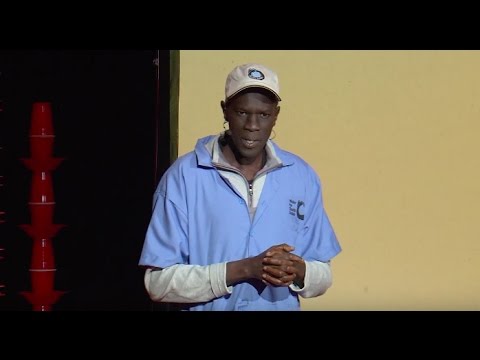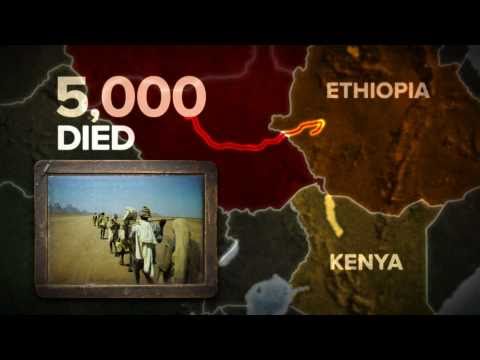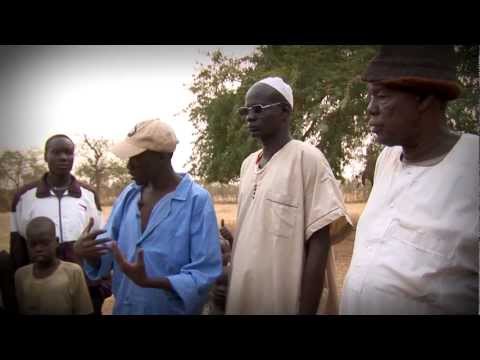Few stories embody the spirit of perseverance and hope like that of Salva Dut. As one of Sudan’s Lost Boys, Dut’s odyssey—from a war-torn childhood to becoming a beacon of change—is nothing short of extraordinary. In this piece, we unravel the captivating journey of Salva Dut, analyzing his unprecedented impact on both local and global scales.

Salva Dut’s Early Life: The Ordeal of a Lost Boy
Born in the rural village of Loun-Ariik in southwestern Sudan to the Dinka tribe, Salva Dut’s early life was filled with simplicity and community. However, at the tender age of 11, his life took a harrowing turn. The Second Sudanese Civil War engulfed his village, separating him from his family in the chaos.
Salva joined thousands of boys, famously known as the Lost Boys of Sudan, on their journey by foot to seek safety. He walked first to a refugee camp in Ethiopia, where he lived for four years. As a teenager, he led 1,500 other boys on an 800-mile trek through the Southern Sudan desert to another refugee camp in Kenya. This perilous journey exposed him to unimaginable hardships: starvation, wild animal attacks, and the constant threat of militia violence. Amidst these tribulations, Salva’s resilience began to shine—a trait that would define his life’s mission.

From Refugee Camps to the Land of Opportunities: Salva Dut’s Transformation
After living in refugee camps for 10 years, Salva found a glimmer of hope through international aid organizations. In 1996, he was given the opportunity to move to the United States, where he was embraced by a family in Rochester, New York. This relocation opened new avenues for education and personal growth.
In America, Salva reunited with distant relatives and embraced the opportunities presented to him. He pursued his education fervently, starting with a high school diploma and eventually earning a degree in International Business from Monroe Community College in Rochester, New York. With knowledge and skills under his belt, Salva was ready to channel his lifelong mission into action.

| Category | Details |
| Full Name | Salva Dut |
| Birthplace | Rural village in southwestern Sudan, Dinka Tribe |
| Age at Separation | 11 years old |
| Conflict | Sudanese Civil War |
| Lost Boys of Sudan | Joined thousands of boys escaping conflict |
| Initial Refugee Camp | Ethiopia |
| Years in Refugee Camps | 10 years |
| Second Refugee Camp | Kenya |
| Role | Leader of 1500 boys on 800-mile trek |
| Journey | Walked 800 miles through Southern Sudan desert |
| Resettlement | Moved to the United States |
| New Home | Rochester, New York |
| Personal Life | Lives a private life; married with kids |
| Notable Group | The Lost Boys of Sudan, 20,000 members |
| Current Status | Advocate, married, children |
Building Water Wells: The Genesis of Water for South Sudan
Salva Dut’s transformative journey culminated in the establishment of Water for South Sudan (WFSS) in 2003. Leveraging his firsthand experiences of water scarcity and its dire consequences, Salva dedicated his life to providing sustainable water sources to the remote villages of South Sudan.
The inception of WFSS was groundbreaking, addressing a critical problem in one of the world’s most underserved regions. The organization’s objective is straightforward yet profound: to drill wells and provide clean drinking water, which fundamentally transforms communities by improving health, fostering education, and stimulating economic development.

Innovative Approaches and Collaborations: The WFSS Impact
WFSS isn’t just about building wells. It pioneers creative approaches tailored to local needs. The organization’s model incorporates community involvement, ensuring that locals are taught to maintain and sustain the wells, thus promoting long-term benefits.
Collaborations with significant entities like the Carter Center for disease eradication and UNICEF for sanitation projects have amplified WFSS’s impact. These partnerships have brought holistic development to South Sudanese communities, transforming lives in ways Salva once dreamed of during his arduous journey.

Personal Anecdotes and Testimonies: Voices from the Ground
You can’t fully appreciate Salva Dut’s impact without hearing from those directly affected by WFSS. For instance, Maria, a young girl from a village in South Sudan, recounts how her life changed after a WFSS well was installed: “Before the well, I spent hours fetching water. Now, I attend school and dream of becoming a teacher.”
Salva’s story and its ripple effects extend far beyond individual wells. They inspire a new generation of South Sudanese to envision a future anchored in stability and growth. Testimonies like Maria’s offer poignant insights into the profound transformations instigated by Salva’s unwavering commitment.
Global Recognition and Continued Advocacy
Salva Dut’s incredible work hasn’t gone unnoticed. He’s received numerous accolades, including the UNICEF Hero Award and recognition by Forbes for his impact on global water accessibility. These honors celebrate Salva and amplify the cause he tirelessly champions.
Salva continues to advocate for South Sudan on global platforms, drawing attention to the ongoing needs of the nation. His engagements at international conferences and with global leaders underscore his role as a bridge between marginalized communities and the global community.
Charting the Future: The Vision Continues
As WFSS looks towards the future, Salva Dut’s vision remains clear yet ambitious. Plans are underway to expand operations, incorporating advanced technology to improve well drilling efficiency and water resource management. Salva’s next mission includes tackling water sanitation and advocating for policies that bolster sustainable development in South Sudan.
Salva Dut’s journey—from a Lost Boy to a global humanitarian—is a narrative of resilience, vision, and unflagging dedication. It encapsulates the incredible human capacity to overcome and create profound change, serving as an enduring beacon of hope and inspiration for generations to come.
Additional Insightful Links
Salva Dut: An Inspirational Journey
Early Struggles
Salva Dut, a name synonymous with resilience and hope, has an incredible life story that’s nothing short of inspiring. His journey began in 1985 when he was forced to flee his village during the Second Sudanese Civil War. Thousands of Lost Boys,( including Salva, trekked hundreds of miles across three countries, facing unimaginable hardships. Shockingly, only about half of the 20,000 boys who fled survived the perilous journey. These escaping young boys had to brave wildlife, disease, and even the threat of soldiers every single day, a fact that underscores the sheer determination and strength that Salva possessed as he moved from one uncertain day to the next.
Unexpected Turns
During this time, Salva’s path took him to Ethiopia and then to Kenya, where he lived in refugee camps. The perseverance displayed by Salva,( who was separated from his family for years, truly encapsulates the spirit of countless refugees around the world. In 1996, Salva’s life took another dramatic turn when he was fortunate enough to be one of the 3,800 “Lost Boys” accepted for resettlement in the United States. Here, Salva didn’t just survive—he thrived. He attended school for the first time at age 22 and later went on to study at an American university. The contrast between his new life and the hardship he endured is staggering, revealing the extreme shifts one life can experience.
Making a Difference
After gaining an education, Salva felt a persistent call to give back to his homeland. In 2003,( he founded Water for South Sudan, a non-profit organization committed to providing sustainable water sources to remote villages. As of today, Salva and his team have drilled over 300 wells, transforming the lives of hundreds of thousands of South Sudanese residents. His work doesn’t stop at quenching thirst; it fosters community health, education, and economic stability. This heroic mission directly illustrates how one person’s resolve can catalyze remarkable change, providing a beacon of hope for future generations.
Lasting Impact
Salva Dut’s story is not just a tale of surviving against all odds, but leaping from suffering to action with a heart full of compassion. His remarkable journey( from a war-torn child to a global humanitarian is a testament to what the human spirit can achieve. Whether it’s his harrowing experiences as a Lost Boy or his legacy with Water for South Sudan, Salva’s life offers abundant lessons in perseverance and altruism. Far from being an average individual, Salva exemplifies the extraordinary impact one can make, against the most formidable adversities.

What is the true story of Salva Dut?
Salva’s story begins in a rural village in southwestern Sudan, where he was part of the Dinka tribe. At just 11, he was separated from his family when the Sudanese Civil War tore through his village. He joined thousands of other boys, known as the Lost Boys of Sudan, walking to refugee camps in Ethiopia and Kenya and eventually getting the chance to move to the United States after spending 10 years in these camps.
What is Salva famous for?
Salva became famous for his incredible journey and leadership among the Lost Boys of Sudan. As a teenager, he led 1,500 boys on an 800-mile trek through the desert to safety in Kenya, after initially escaping to a refugee camp in Ethiopia when the war reached his village. His story of survival and eventual migration to the United States has inspired many.
Does Salva Dut have kids?
Yes, Salva Dut is married and has kids. However, he keeps his personal life pretty private and doesn’t share a lot of details about his family.
Why did Salva vomit?
Salva’s vomiting wasn’t directly discussed in the provided information, so it’s a bit unclear why it might have happened. However, it could be speculated that during his long journey and harsh conditions, such an incident might have occurred due to exhaustion, hunger, or illness.
Does Salva find out his dad is still alive?
Yes, Salva eventually found out that his dad was still alive. After being separated for many years due to the civil war, they were eventually reunited, which was a pivotal and emotional moment in Salva’s life.
How did the lost children of Sudan survive?
The Lost Boys of Sudan survived through sheer determination and support from each other. They made long, arduous treks across dangerous terrain to reach refugee camps, relying on scant supplies, the help of aid organizations, and their own resilience to endure incredibly harsh conditions.
What happened to Salva Dut in 2003?
In 2003, Salva Dut embarked on a new chapter by moving to the United States, where he was welcomed by a family in Rochester, New York. This move opened up many opportunities for Salva and marked a significant turning point in his life.
What did Salva do to survive?
To survive, Salva relied on his resilience and leadership. He walked long distances with little food or water, avoided dangerous animals, and crossed war zones. The support from fellow Lost Boys and eventually, assistance from refugee camps and international aid, also played key roles in his survival.
How did Salva lose his family?
Salva lost his family when the Sudanese Civil War reached his village, causing chaos and forcing everyone to flee in different directions. Unfortunately, in the disorder and confusion, Salva got separated from the rest of his family and started his long journey of survival on his own.
Why did Nya frown when the crew finally got the water to shoot out of the ground?
Nya frowned when the crew finally got the water to shoot out of the ground because the water was muddy. After all the hard work and waiting, seeing the water come out unclean was probably disappointing and didn’t match the hope she had for clean, drinkable water.
What diseases impacted the Lost Boys of Sudan?
The Lost Boys of Sudan were impacted by many diseases due to the harsh conditions they endured. Common illnesses included malaria, diarrhea, and infections caused by poor sanitation and malnutrition in the refugee camps. These diseases added to their already immense struggles and hardships.



























